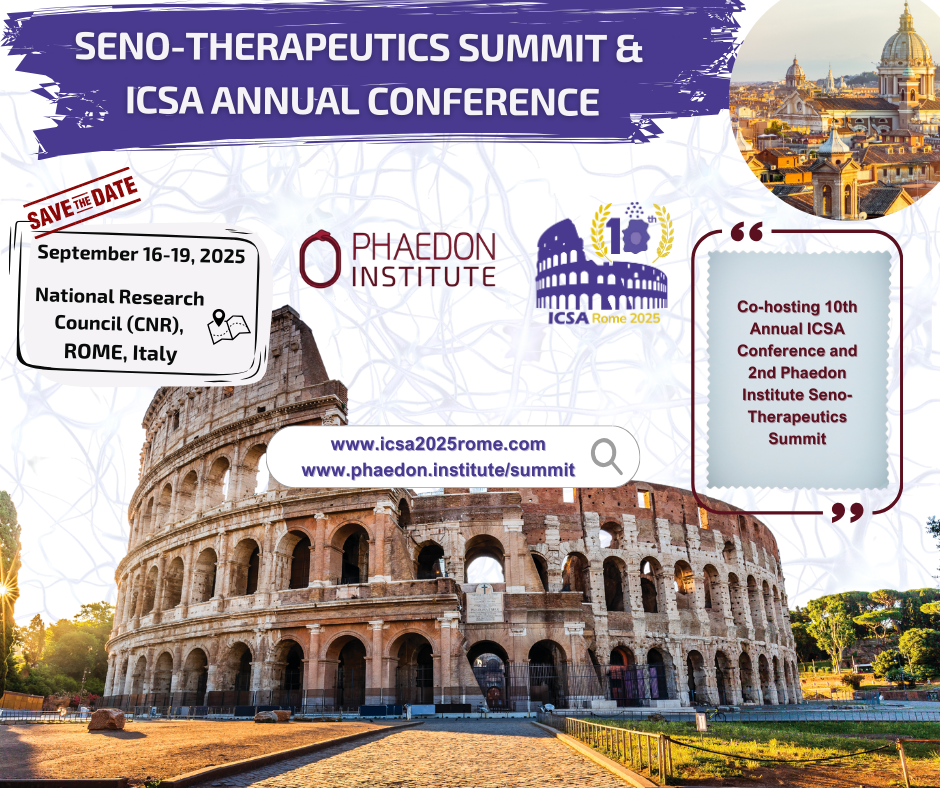Phaedon Institute is honored to co-host the 2nd Senotherapeutics Summit alongside the 10th Annual ICSA Conference.
This landmark gathering will take place September 16th–19th at the prestigious National Research Council (CNR) in Rome, Italy. Bringing together the brightest minds in senescence biology, these premier events will unite world-renowned scientists, industry pioneers, and visionaries, fostering collaboration and innovation to push the boundaries of therapeutic advancements in cellular senescence.
Title: Novel MitoXcel™ Geropeptides Demonstrate Features of Safe and Effective Gerotherapeutics
Authors: Daniel Jasinski, Ph.D., Meena Balakrishnan, Kyra Courtney, Samantha Moreno, Stephen Shaw, Stacey Allen, PhD, Danielle Grabert, Ashley Perry and Kevin Slawin, MD.
MitoXcel™ Technology-powered geropeptides have the remarkable ability to rejuvenate naturally aged mice via two separate mechanisms, both via targeting the lower Mitochondrial Membrane Potential (MMP, ΔΨm) that develops in aging cells, to dramatically eliminate senescent cells throughout the body, and to enhance the efficiency of mitochondrial function in aging cells. In naturally aged 75-week-old mice, senescent cell burden was reduced by treatment with MitoXcel™ geropeptide PTC-2105 in iWAT by 67.8% (P<0.0001), 53.8% (P<0.0001), and 52.5% (P = 0.0993) as analyzed by uPAR, p16, and SA-β-gal histological staining, respectively, relative to saline-treated control mice. This resulted in body composition reshaping towards a higher lean muscle to fat ratio, as indicated by a DEXA-measured increase in muscle mass and reduction in body fat percentage, and led to improved endurance, balance, strength, and overall exercise capability as measured by Rotarod, motorized treadmill, and grip strength testing. After 20 weeks of treatment with MitoXcel™ geropeptide PTC-2107, we demonstrated an overall 11% weight loss, remarkably comprised of a 34% fat mass loss and a 23% lean mass GAIN, without directly targeting either fat or muscle, compared to saline-treated controls in naturally aged 75-week-old mice.
Furthermore, MitoXcel™ Technology-powered oncopeptide PTC-2110 significantly improved overall survival in an aggressive B cell Acute Lymphoblastic Leukemia (“B-ALL”) in vivo TOM-1 tumor model, harboring both a wild type ABL1 and JAK2 V617F mutation, that, similarly to SnCs, exhibit a lower Mitochondrial Membrane Potential (MMP, ΔΨm) compared to normal cells (log rank – saline vs PTC-2110 = 0.0034). In animals alive on Day 31, at End of Study, animals treated with PTC-2110 exhibited almost complete control of tumor cells, equivalent to ponatinib-treated mice, as evidenced by flow cytometry of lung and spleen, despite the significantly lower exposure to drug treatment (24 vs 5 total doses per animal per group or almost 5X greater in the ponatinib-treated group) and the absence of any ABL1-targeted TKI therapy in PTC-2110-treated animals. These results open the door for a potential safe and effective new class of cancer therapeutics and highlight the potential of MitoXcel™ Technology in mitigating age-related decline and improving overall healthspan, the hallmark features of a gerotherapeutic. Eos SENOLYTIX is performing IND-enabling studies of this technology with the goal of beginning human clinical trials in 2026.
Join us as we shape the future of longevity science and transformative medicine.


